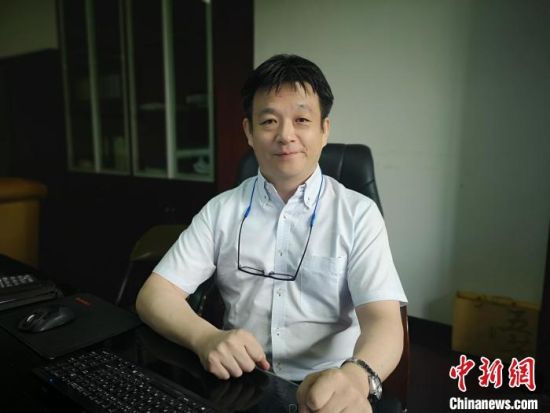

Naoki Morita. [Photo/ Liu Man]
“After the old industrial zone in Zhuzhou was relocated, the air quality is improved, the sky is azure blue and the water is crystal clear. All this makes me happier living here,” said Naoki Morita (森田尚希), a Japanese who has been working and living in China for more than 10 years, during which he moved from Jinan to Shanghai and other places. In 2016, he settled down in Hunan and planned to work in Zhuzhou until retirement.
Naoki Morita, born in Osaka, Japan in 1969, came to study in China in the 1990s and then began his stories with China. He is now serving at both Zhuzhou Jianshe Yamaha Motor Co., Ltd. and Zhuzhou Yamaha Motor Shock-absorber Co., Ltd. (president).
![Naoki Morita is now serving at both Zhuzhou Jianshe Yamaha Motor Co., Ltd. and Zhuzhou Yamaha Motor Shock-absorber Co., Ltd. (president). [Photo/ Liu Man] Naoki Morita is now serving at both Zhuzhou Jianshe Yamaha Motor Co., Ltd. and Zhuzhou Yamaha Motor Shock-absorber Co., Ltd. (president). [Photo/ Liu Man]](http://www.hn.chinanews.com/2021/1014/U407P9DT20211014145506.jpg)
“I have no problem with communication, and I love spicy food. So I fit into the local environment perfectly,”said Morita, who described his life in Hunan as very comfortable. He became interested in Chinese culture when he was a child, and began to learn Chinese before he reached 20. During his school years in Japan, he saw the movie Hibiscus Town, which was shot in western Hunan. Many years ago, he went to Zhuzhou, Hunan on a business trip, hence strengthened his knowledge and fondness of Hunan.
After finishing his studies in the department of Chinese language and literature at Peking University in 1992, Morita had the idea of settling in China. “China has developed very fast since reform and opening-up, especially in the coastal areas, and I can see a promising future here,” said Morita, who also studied Cantonese at Sun Yat-sen University while looking for a job.
Morita later joined Yamaha and returned to Japan. Because of his proficiency of Chinese and familiarity with China, since 2005 Morita was sent to other branches in Shandong, Shanghai, and Hunan, being responsible for sales, planning, management, etc.
“The two companies I work for now have over 600 employees. People in Hunan are passionate and warm-hearted, so it is very pleasant to get along and work with them,” said Morita. After settling in Hunan, Morita quickly adapted himself to the life and work in here with the help of his colleagues.
In his spare time, Morita attends speech contests for Japanese majors at Hunan University, sometimes as a judge, but more often with a motive to communicate with young Chinese. “It is a tradition of our company to participate in cultural exchange activities. Japan and China are neighbors and cooperation can only be strengthened by increasing mutual understanding,”said Morita.
Traditional Chinese culture, including ancient poetry, martial arts and erhu (a musical instrument), has also become a favorite of Morita in order to better understand China. As Morita said, “The rhyme of ancient poetry, for example, makes you really enjoy reading it. A few words can contain so much emotion and profound artistic conception.”
Morita loves sports, cooking and reading. Interested in Hunan culture, he is studying Zeng Guofan's Family Precept (Zeng Guofan, a renowned military leader born in Hunan). When visited by Japanese friends, Morita will take them to Shaoshan, Ningxiang and other red tourist attractions.
“Hunan has a long history and profound culture. It is not only rich in tourism resources, but also open and inclusive, and is becoming more and more 'international'. Many foreigners love this place, and choose to work and live here,” said Morita. Having experienced the charm of Changsha, an “internet-famous” city for young people; and witnessed the transformation of Zhuzhou Qingshuitang Old Industrial Zone, Morita’s affection for this vibrant central province of Hunan grew.
Living in Zhuzhou, a city known as the “capital of electric locomotives in China”, Morita has first-hand experience of China’s rapid economic and social development, especially in the field of transportation. “For example, express payment makes life easier; high-speed rail, urban rail, maglev and other diverse means of transportation make travel easier. Now my first choice of business trips would be high-speed rail,” said Morita.
Over the years, Morita has been to many cities in China on business trips, and is now regarded as a “China hand” by his colleagues. Talking about the future, Morita said that China is attaching greater importance to environmental protection, and the company is constantly making technological innovations in its product line. By making the most of Hunan's favorable geographical location, business environment and human resources, he will sustain the company’s success in Chinese market.
